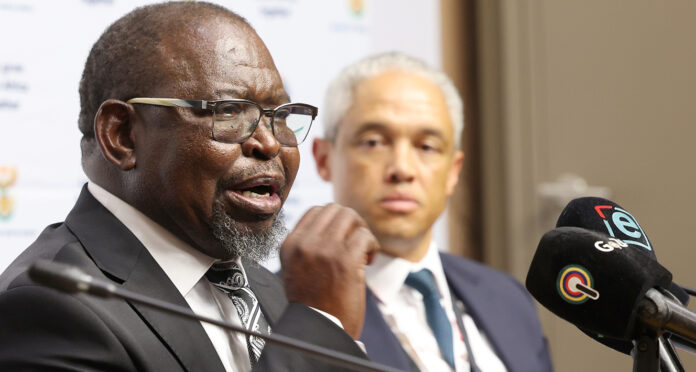“The good news is that we are back to 41 clean audits… However, that makes up 15% of the municipalities across the country. I worry that I will sound like a stuck record,” Auditor-Gene-ral Tsakani Maluleke said in a briefing to parliament in May.
Residents across SA scramble for clean water, navigate pothole-ravaged roads and endure rolling blackouts, their municipalities are busy playing a twisted game of financial hot potato with billions meant to fix these very problems.
In 2024, municipalities spent only R12.8-billion of their R44.1-billion conditional grant allocation, a pathetic 29.1% usage rate.
The latest auditor-general findings paint a damning picture of municipal governance that extends far beyond mere administrative inefficiency.
When Maluleke delivered her briefing to parliament, she might as well have been reading the municipal obituary. Only 41 clean audits out of 275 municipalities while the rest wallow in financial chaos.
But here’s where the story becomes truly infuriating. While children in Eastern Cape villages walk for hours for water and elderly residents in Free State towns suffer through another winter without electricity, their municipalities were busy returning billions to National Treasury.
Eastern Cape’s rural municipalities alone returned R2.2-billion in unspent grants since 2019, while Free State, Gauteng and Western Cape showed expenditure rates of just 37.7%, 30.4%, and 31.6% respectively by December 2024.
This isn’t incompetence; it’s an abdication of the social contract.
The numbers tell a story of breathtaking dysfunction. Johannesburg, Africa’s largest city, leads the nation with over R1-billion in irregular expenditure, much awarded to contractors with connections to officials.
Consider the Municipal Finance Management Act, which requires municipalities to spend conditional grants within specified time frames or lose them. This law exists precisely to prevent the current farce, yet 219 municipalities collectively spent R1.47-billion on consultants just to compile financial statements: money that could have built schools, fixed roads, or provided clean water.
What makes this particularly galling is the gap between political rhetoric and reality. Politicians campaign on service delivery promises, yet their administrations consistently demonstrate they lack either the capacity or the will to execute basic functions.
Buffalo City, in Eastern Cape, has had a vacancy for district engineer responsible for electricity for 80 months: nearly seven years. How can we speak of development when municipalities can’t even fill critical engineering positions?
The auditor-general’s assessment reveals a system where accountability has become optional. Cooperative governance MECs fail to compile mandatory municipal performance reports, and when they do, provincial legislatures ignore them.
This creates a perfect storm of negligence where everyone points fingers while communities suffer.
Perhaps most damning is the cultural rot this represents. Even municipalities that hire consultants to prepare financial statements still submit poor-quality work because the consultants’ work isn’t reviewed. This suggests a fundamental breakdown in professional standards and accountability that goes beyond mere technical capacity.
Meanwhile, suppliers and creditors wait 286 days on average to receive payments from municipalities, creating a cascade of economic dysfunction that strangles local economies.
Small businesses close, jobs disappear, and communities sink deeper into poverty, all the while billions sit unspent.
Every rand returned to the Treasury represents a pothole not filled, a clinic not built, a community not connected to clean water.
The solution isn’t more money or new policies. It’s accountability. It’s a professional consequence for failure. It’s treating public service as exactly that: service to the public, not a career ladder for the connected.
The question isn’t whether SA can afford to fix this crisis; it’s whether we can afford not to.
- Qaba is a PhD scholar and works in communications in a government entity



